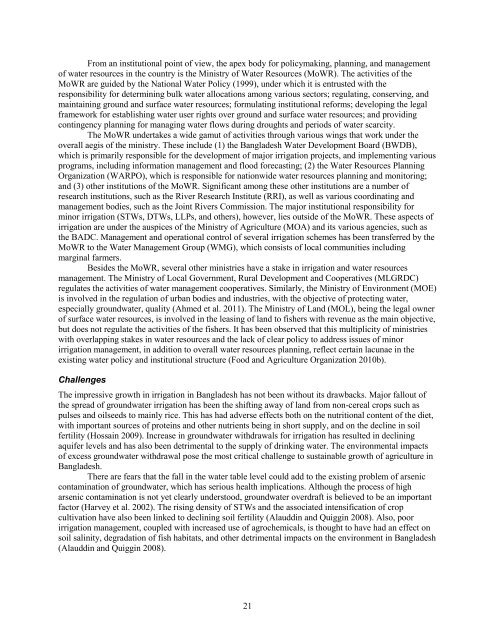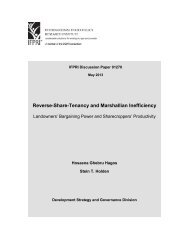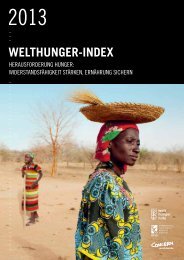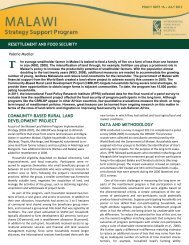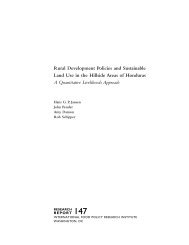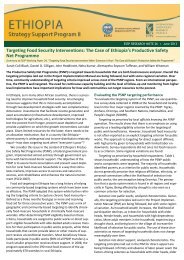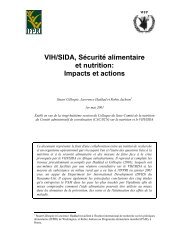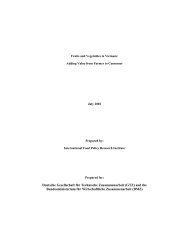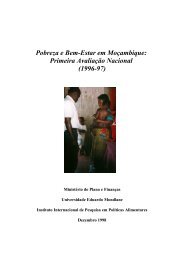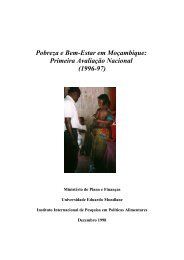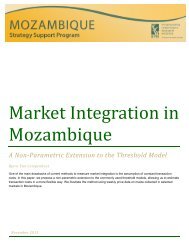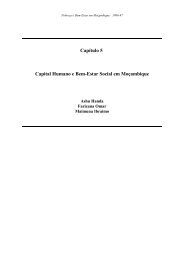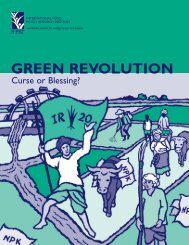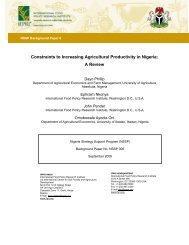Review of Input and Output Policies for Cereal Production in ...
Review of Input and Output Policies for Cereal Production in ...
Review of Input and Output Policies for Cereal Production in ...
You also want an ePaper? Increase the reach of your titles
YUMPU automatically turns print PDFs into web optimized ePapers that Google loves.
From an <strong>in</strong>stitutional po<strong>in</strong>t <strong>of</strong> view, the apex body <strong>for</strong> policymak<strong>in</strong>g, plann<strong>in</strong>g, <strong>and</strong> management<br />
<strong>of</strong> water resources <strong>in</strong> the country is the M<strong>in</strong>istry <strong>of</strong> Water Resources (MoWR). The activities <strong>of</strong> the<br />
MoWR are guided by the National Water Policy (1999), under which it is entrusted with the<br />
responsibility <strong>for</strong> determ<strong>in</strong><strong>in</strong>g bulk water allocations among various sectors; regulat<strong>in</strong>g, conserv<strong>in</strong>g, <strong>and</strong><br />
ma<strong>in</strong>ta<strong>in</strong><strong>in</strong>g ground <strong>and</strong> surface water resources; <strong>for</strong>mulat<strong>in</strong>g <strong>in</strong>stitutional re<strong>for</strong>ms; develop<strong>in</strong>g the legal<br />
framework <strong>for</strong> establish<strong>in</strong>g water user rights over ground <strong>and</strong> surface water resources; <strong>and</strong> provid<strong>in</strong>g<br />
cont<strong>in</strong>gency plann<strong>in</strong>g <strong>for</strong> manag<strong>in</strong>g water flows dur<strong>in</strong>g droughts <strong>and</strong> periods <strong>of</strong> water scarcity.<br />
The MoWR undertakes a wide gamut <strong>of</strong> activities through various w<strong>in</strong>gs that work under the<br />
overall aegis <strong>of</strong> the m<strong>in</strong>istry. These <strong>in</strong>clude (1) the Bangladesh Water Development Board (BWDB),<br />
which is primarily responsible <strong>for</strong> the development <strong>of</strong> major irrigation projects, <strong>and</strong> implement<strong>in</strong>g various<br />
programs, <strong>in</strong>clud<strong>in</strong>g <strong>in</strong><strong>for</strong>mation management <strong>and</strong> flood <strong>for</strong>ecast<strong>in</strong>g; (2) the Water Resources Plann<strong>in</strong>g<br />
Organization (WARPO), which is responsible <strong>for</strong> nationwide water resources plann<strong>in</strong>g <strong>and</strong> monitor<strong>in</strong>g;<br />
<strong>and</strong> (3) other <strong>in</strong>stitutions <strong>of</strong> the MoWR. Significant among these other <strong>in</strong>stitutions are a number <strong>of</strong><br />
research <strong>in</strong>stitutions, such as the River Research Institute (RRI), as well as various coord<strong>in</strong>at<strong>in</strong>g <strong>and</strong><br />
management bodies, such as the Jo<strong>in</strong>t Rivers Commission. The major <strong>in</strong>stitutional responsibility <strong>for</strong><br />
m<strong>in</strong>or irrigation (STWs, DTWs, LLPs, <strong>and</strong> others), however, lies outside <strong>of</strong> the MoWR. These aspects <strong>of</strong><br />
irrigation are under the auspices <strong>of</strong> the M<strong>in</strong>istry <strong>of</strong> Agriculture (MOA) <strong>and</strong> its various agencies, such as<br />
the BADC. Management <strong>and</strong> operational control <strong>of</strong> several irrigation schemes has been transferred by the<br />
MoWR to the Water Management Group (WMG), which consists <strong>of</strong> local communities <strong>in</strong>clud<strong>in</strong>g<br />
marg<strong>in</strong>al farmers.<br />
Besides the MoWR, several other m<strong>in</strong>istries have a stake <strong>in</strong> irrigation <strong>and</strong> water resources<br />
management. The M<strong>in</strong>istry <strong>of</strong> Local Government, Rural Development <strong>and</strong> Cooperatives (MLGRDC)<br />
regulates the activities <strong>of</strong> water management cooperatives. Similarly, the M<strong>in</strong>istry <strong>of</strong> Environment (MOE)<br />
is <strong>in</strong>volved <strong>in</strong> the regulation <strong>of</strong> urban bodies <strong>and</strong> <strong>in</strong>dustries, with the objective <strong>of</strong> protect<strong>in</strong>g water,<br />
especially groundwater, quality (Ahmed et al. 2011). The M<strong>in</strong>istry <strong>of</strong> L<strong>and</strong> (MOL), be<strong>in</strong>g the legal owner<br />
<strong>of</strong> surface water resources, is <strong>in</strong>volved <strong>in</strong> the leas<strong>in</strong>g <strong>of</strong> l<strong>and</strong> to fishers with revenue as the ma<strong>in</strong> objective,<br />
but does not regulate the activities <strong>of</strong> the fishers. It has been observed that this multiplicity <strong>of</strong> m<strong>in</strong>istries<br />
with overlapp<strong>in</strong>g stakes <strong>in</strong> water resources <strong>and</strong> the lack <strong>of</strong> clear policy to address issues <strong>of</strong> m<strong>in</strong>or<br />
irrigation management, <strong>in</strong> addition to overall water resources plann<strong>in</strong>g, reflect certa<strong>in</strong> lacunae <strong>in</strong> the<br />
exist<strong>in</strong>g water policy <strong>and</strong> <strong>in</strong>stitutional structure (Food <strong>and</strong> Agriculture Organization 2010b).<br />
Challenges<br />
The impressive growth <strong>in</strong> irrigation <strong>in</strong> Bangladesh has not been without its drawbacks. Major fallout <strong>of</strong><br />
the spread <strong>of</strong> groundwater irrigation has been the shift<strong>in</strong>g away <strong>of</strong> l<strong>and</strong> from non-cereal crops such as<br />
pulses <strong>and</strong> oilseeds to ma<strong>in</strong>ly rice. This has had adverse effects both on the nutritional content <strong>of</strong> the diet,<br />
with important sources <strong>of</strong> prote<strong>in</strong>s <strong>and</strong> other nutrients be<strong>in</strong>g <strong>in</strong> short supply, <strong>and</strong> on the decl<strong>in</strong>e <strong>in</strong> soil<br />
fertility (Hossa<strong>in</strong> 2009). Increase <strong>in</strong> groundwater withdrawals <strong>for</strong> irrigation has resulted <strong>in</strong> decl<strong>in</strong><strong>in</strong>g<br />
aquifer levels <strong>and</strong> has also been detrimental to the supply <strong>of</strong> dr<strong>in</strong>k<strong>in</strong>g water. The environmental impacts<br />
<strong>of</strong> excess groundwater withdrawal pose the most critical challenge to susta<strong>in</strong>able growth <strong>of</strong> agriculture <strong>in</strong><br />
Bangladesh.<br />
There are fears that the fall <strong>in</strong> the water table level could add to the exist<strong>in</strong>g problem <strong>of</strong> arsenic<br />
contam<strong>in</strong>ation <strong>of</strong> groundwater, which has serious health implications. Although the process <strong>of</strong> high<br />
arsenic contam<strong>in</strong>ation is not yet clearly understood, groundwater overdraft is believed to be an important<br />
factor (Harvey et al. 2002). The ris<strong>in</strong>g density <strong>of</strong> STWs <strong>and</strong> the associated <strong>in</strong>tensification <strong>of</strong> crop<br />
cultivation have also been l<strong>in</strong>ked to decl<strong>in</strong><strong>in</strong>g soil fertility (Alaudd<strong>in</strong> <strong>and</strong> Quigg<strong>in</strong> 2008). Also, poor<br />
irrigation management, coupled with <strong>in</strong>creased use <strong>of</strong> agrochemicals, is thought to have had an effect on<br />
soil sal<strong>in</strong>ity, degradation <strong>of</strong> fish habitats, <strong>and</strong> other detrimental impacts on the environment <strong>in</strong> Bangladesh<br />
(Alaudd<strong>in</strong> <strong>and</strong> Quigg<strong>in</strong> 2008).<br />
21


